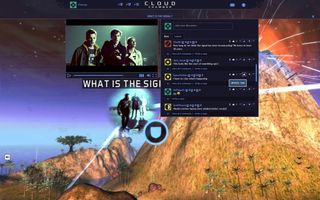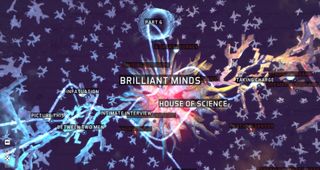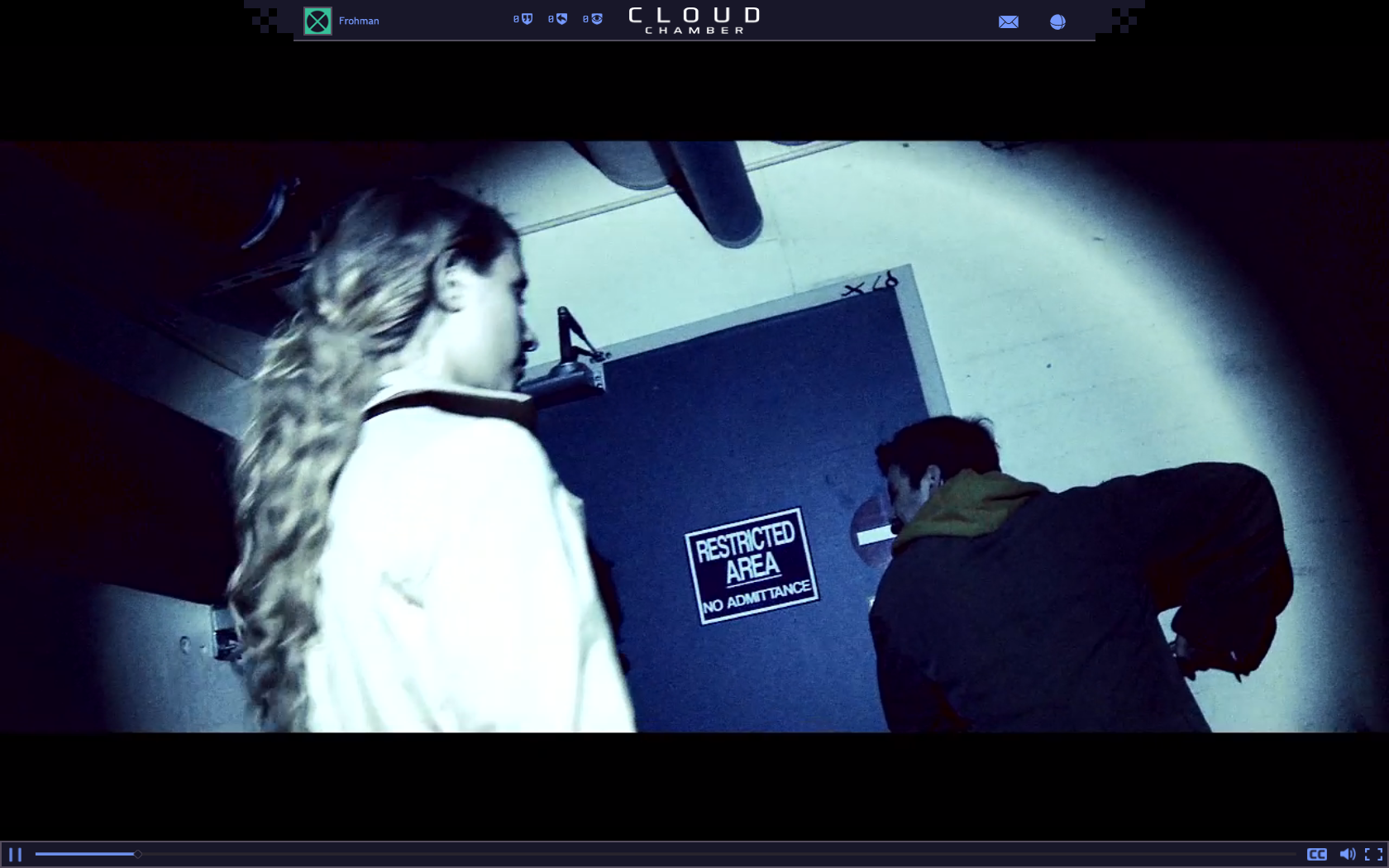Our Verdict
An innovative format for a mystery but lacking in story and performances, and overly reliant on peer approval.
PC Gamer's got your back
Price: $20/£12
Release date: Out now
Publisher/Developer: Investigate North
Multiplayer: Massively multiplayer, collaborative
Link: Official Site
A mysterious signal, possibly from outer space. The death of the person who discovered it, possibly from foul play. A database consisting of distorted video clips and scientific calculations, hastily scanned documents and blurry photocopies, scribbled notes and old photographs, all needing to be examined, sorted out, and puzzled over.
Cloud Chamber is a great idea: a video game disguised as an alternate-reality game. Who doesn't love pausing a murky video clip to squint closely at a single frame, or suspiciously examining people's actions for evidence of secret motives, or hatching wild theories and reading the even wilder theories of others? Unfortunately, a number of problems prevent that great idea from becoming a great game.
In Cloud Chamber, players travel through ten chapters of a story: a jumbled, out-of-order story composed of data nodes that have been hastily uploaded to a database. The database itself is visualized as a 3D landscape, and traveling through it swoops and swings you along threads that connect the nodes to one another. It's all very slick and stylish, both atmospheric and eerie, and each chapter has its own specific visual theme and soundtrack.

The story concerns Kathleen, the daughter of the scientist who discovered the mysterious signal. She's joined by Max, a gifted musician and sound technician, and Tom, who's making a documentary about the scientific institute run by Kathleen's father, a stern, secretive figure named Gustav. As we watch bits of video recorded by Tom's cameras, we begin to piece together a timeline of events while other data nodes slowly expose us to the characters, their motivations and histories, and a dramatic experiment they performed that may have unlocked the secrets of the signal.
Spacebook
While trying to piece together the mystery of the signal, players discuss their findings and thoughts with other players. Every data node has a comment section attached to it, and players can post comments about what they've seen, respond to the comments others have left, and upvote or downvote (or, often, completely ignore) what other players have written, Reddit-style.
In addition to the common data nodes players can visit on their journey through the game, there are also restricted nodes: packets of data you can't examine unless you've participated enough in the global discussion. Participation means both posting comments and, more importantly, receiving enough upvotes from other players on things you've posted. It may take a while to get upvotes, meaning you'll have to revisit earlier chapters later, perhaps even days later, to view the restricted data. And, if you don't get enough upvotes, you won't be able to examine the restricted nodes at all, nor participate in the discussions about them.

You can probably already see a few problems with this system. The first issue I came across was that after examining certain data nodes, I simply didn't have that much to say. Sometimes these nodes contain only a few seconds of video (often a portion of which we've seen before) or a brief email, or a clip from a real science documentary, and I often struggled to contribute something worthwhile after viewing them. Still, wanting to participate, I'd just post something meaningless and perfunctory, like "Is he being truthful?" or "What do you think that meant?" just so someone might reply, or better, give it a thumbs up.
Plenty of other players did the same. "What is causing the video distortion?" was a common comment after almost every single video clip in the first half of the game, as we all struggled to get conversations started and win the up-thumbings of our fellow detectives. In some threads I even resorted to shamelessly flattering other commenters in hopes of gaining a cheap like. "Great catch!" I'd exclaim at their utterly commonplace observation. "Thanks for pointing that out! I totally missed that!" Disgusting, I know? But I wanted the upvotes. I wanted to unlock all the content. We all did.

There are a few other issues with the system's design. Unlike, say, Reddit, there's no quick and easy way to view all the posts someone has made. One scientifically minded commenter was providing tons of useful information, but clicking his profile didn't give me a list of his posts (or anything whatsoever), so I just had to trawl through node after node trying to find what else he'd written. There's also a bit of lag while typing, and sometimes scrolling down through a thread won't load more than a page or two of comments. On the plus side, unlike Reddit, the game's moderators have done done a fantastic job keeping out pointless profanity and abusive comments. I have only seen one truly nasty post (it was aimed at me, despite my enthusiastic flattery of others) and it was removed quickly.
The other big issue is with the writing and performances. The dialogue is often clunky, the characters are not particularly compelling, and the acting, despite a couple recognizable performers (Gethin Anthony from Game of Thrones and Jesper Christensen from Casino Royale), is rather unconvincing. Heated arguments, tear-filled confessions, tender moments: none of it ever feels truly urgent or genuine. Added to that, there are only four characters with dialogue, and one of them has barely any screen time, with most of his character developed by documents and transcripts. As a result, it feels less like we're witnessing the unraveling of an earth-shattering, decades-old conspiracy and more like we're watching a small television production with an even smaller casting budget.

Ultimately, I grew somewhat bored with Cloud Chamber about halfway through, and as the tiny bits of data trickled past it just didn't feel like enough of a story, or an interesting enough story, to fully fill its ten chapters. The restricted nodes, once unlocked, do add a considerable amount of new data to help define the characters and add some new insights, but I'm skeptical that unlocking content through the upvotes of strangers was the best design choice. At the same time, I admire the unusual format of the game and the attempt to make something different.
An innovative format for a mystery but lacking in story and performances, and overly reliant on peer approval.

Chris started playing PC games in the 1980s, started writing about them in the early 2000s, and (finally) started getting paid to write about them in the late 2000s. Following a few years as a regular freelancer, PC Gamer hired him in 2014, probably so he'd stop emailing them asking for more work. Chris has a love-hate relationship with survival games and an unhealthy fascination with the inner lives of NPCs. He's also a fan of offbeat simulation games, mods, and ignoring storylines in RPGs so he can make up his own.
